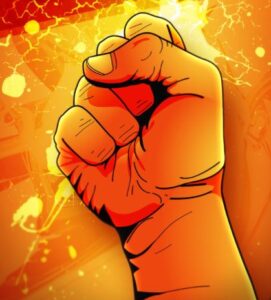
by James A. Bacon
The university alumni rebellion, which first took root in Virginia, is going national.
Washington & Lee University was the first higher-ed institution in the country, to my knowledge, where alumni organized to fight the leftward drift of their alma mater. The W&L group, known as the Generals Redoubt, was followed quickly by The Jefferson Council (to which I belong) at the University of Virginia and The Spirit of VMI at the Virginia Military Institute.
Now the W&L and UVa groups have joined with newly formed alumni organizations at Princeton University, Cornell University and Davidson College to form the Alumni Free Speech Association. While each institution has its unique, parochial issues, they share a common resolve to stand up for free speech, free expression, independent inquiry, and intellectual diversity in the face of a doctrinaire “woke” ideology that, in increasingly totalitarian fashion, dictates the permissible range of opinions people are allowed to express.
Graduates are creating new organizations from scratch because the incumbent alumni organizations almost universally have failed to represent all of the alumni. They have been co-opted by the university presidents and turned into fund-raising arms. If the University of Virginia alumni association is any indication — and I hear the same critique of the associations at W&L and VMI — they function as rah-rah-aren’t-we-great propaganda arms for their university administrations and sugar-coat the march toward leftist orthodoxy.
In a column published in the Wall Street Journal today, Princetonians Stuart Taylor Jr. and Edward Yingling explain why alumni are the only constituency in the modern-day university capable of standing up for freedom of speech and diversity of thought.
Why alumni? Because with rare exceptions, everyone else may feel too exposed to attacks to take a stand against campus culture. Our experience is that the few student free-speech groups don’t have many members (Princeton’s has about 20). Champions of free speech among faculty are badly outnumbered, even as many left-of-center professors are starting to realize that they too can be brutally canceled by the mob. Those few students and faculty who speak up often feel isolated and exposed.
University trustees, presidents and other administrators are also usually mired in the toxic campus environment, which responds to heresy with attacks. Most have either been cowed by or genuinely believe in a woke orthodoxy that sees free speech as an inconvenient disruption.
That leaves alumni as the only university stakeholders with the numbers and clout to lead the defense of free speech, academic freedom and viewpoint diversity in campus environments. Free speech and academic freedom are fundamental to the advancement of knowledge and to the success of our colleges and universities. Will all teaching and research at these schools soon be subject to a mandated orthodoxy? Will parents keep paying to send their children places where the fundamental elements of learning are suppressed? These institutions constantly seek alumni involvement and contributions. Alumni have the ability and duty to demand that their schools maintain the reasons for which they were created. But to be effective, alumni need to organize.
At UVa, as we have documented, job applicants are often required to fill out forms illuminating their views about diversity, equity and inclusion, effectively creating an ideological litmus test for employment. Once employed, faculty and staff often are required to undergo “diversity, equity, and inclusion” training derived from Critical Race Theory that casts Whites as oppressors and Blacks as victims. Ideological discipline is enforced by means of expulsion through arcane administrative processes such as No Trespass Orders or, in the case of the medical school, the issuance of Orwellian-named Professionalism Concern Cards. Twitter Outrage Mobs target the few transgressors who don’t get the message, and university administrators do next to nothing.
Every university is unique, and wokeness may take other forms elsewhere, but the results are the same — rampant self censorship by students and faculty, and and an every-narrowing range of permissible views.
Alumni involvement will be criticized, to be sure. These groups will be delegitimized as the reactionary complaints of old, White, heteronormative males. But we don’t speak only for ourselves — we speak for many others. As have reached out to students, parents, and even a few faculty and staff, we have found we have many allies.
Unlike them, most of us are retired. We can’t be canceled. We can freely speak our mind.

Leave a Reply
You must be logged in to post a comment.